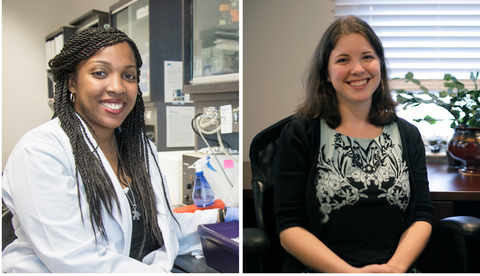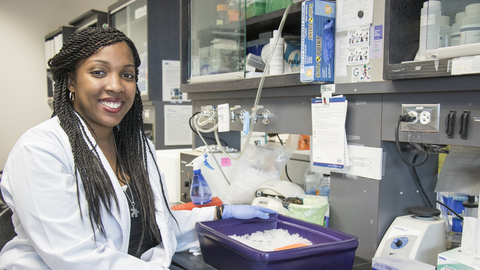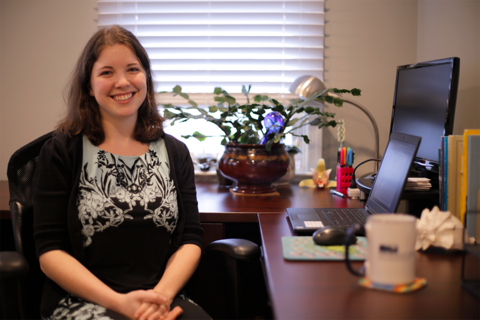Shadaesha Green Awarded 2021 Knauss Fellowship
 CAMBRIDGE, MD (July 24, 2020)—Two University of Maryland Center for Environmental Science graduate students have been named finalists of the John A. Knauss Marine Policy Fellowship program sponsored by Sea Grant and NOAA. Shadaesha Green, an IMET student, and Suzi Spitzer, a student at IMET’s partner UMCES-IAN, will join the 42nd class of the fellowship, and be placed in a government organization at a position in either the Executive or Legislative branches of government on coastal and marine science policy for one year.
CAMBRIDGE, MD (July 24, 2020)—Two University of Maryland Center for Environmental Science graduate students have been named finalists of the John A. Knauss Marine Policy Fellowship program sponsored by Sea Grant and NOAA. Shadaesha Green, an IMET student, and Suzi Spitzer, a student at IMET’s partner UMCES-IAN, will join the 42nd class of the fellowship, and be placed in a government organization at a position in either the Executive or Legislative branches of government on coastal and marine science policy for one year.
This year the John A. Knauss Marine Fellowship gave 74 graduate students who are interested in ocean, coastal, and Great Lakes policy issues and national policy decisions around those issues the opportunity to work in federal and congressional offices.
“Through the Fellowship, I hope to continue communicating complex scientific information so that it can be easily understood and used by a non-specialist audience,” said Spitzer, a Ph.D. candidate at UMCES’ Integration and Application Network (IAN).
Every year, finalists from the Knauss Fellowship are selected after being reviewed on both state and national levels, and placed in a governmental organization after interviews with executive and legislative offices.
The impact of their policy work may take place at the Legislative (e.g. Senate Committee on Environment and Public Works, Senate Commerce Committee, House Committee on Natural Resources) or Executive (e.g. NOAA, Department of the Interior, National Science Foundation, U.S. Navy) levels.
“As trusted scientific advisors to state and national leaders, UMCES scientists not only provide unbiased research to inform public policy but also train the next generation of environmental leaders to connect their passion for the environment to a greater good,” said University of Maryland Center for Environmental Science President Peter Goodwin. “We are once again proud to have UMCES students selected to be a part of the prestigious Knauss Fellowship program and to have the opportunity to learn about making an impact on coastal and marine science policy.”
Meet the Finalists
 Shadaesha Green is a Ph.D. candidate at the Institute of Marine and Environmental Technology, working with professor Sook Chung to investigate the reproductive biology of female red deep-sea crab to further the understanding of this biology throughout various life phases and to outline the current genetic diversity populations of the species.
Shadaesha Green is a Ph.D. candidate at the Institute of Marine and Environmental Technology, working with professor Sook Chung to investigate the reproductive biology of female red deep-sea crab to further the understanding of this biology throughout various life phases and to outline the current genetic diversity populations of the species.
"I am really excited to have been chosen as a Knauss Marine Policy fellow. I look forward to spending the year learning how marine policy is developed to conserve and protect our marine resources. All of the wonderful training I have received at IMET and UMCES has prepared me well and I hope to make everyone proud," said Green.
She is a doctoral scholar in NOAA’s Living Marine Resources Cooperative Science Center (LMRCSC), a program which trains and graduates students from underrepresented communities in marine science for careers in research, management, and public policy. In recent years, three other LMRCSC graduate fellows have received Knauss fellowships: Jeanette Davis, Ammar Hanif and Amanda Lawrence.
 Suzi Spitzer is a graduate research assistant and Ph.D. candidate at the Integration and Application Network. Her research examines public engagement in Chesapeake Bay environmental science and management and investigates how citizen science can more effectively be used by the scientific community to create science that informs inclusive, collaborative, and innovative environmental management decisions. Her research will help scientists more effectively use citizen science to foster collaborations with diverse nonacademic partners.
Suzi Spitzer is a graduate research assistant and Ph.D. candidate at the Integration and Application Network. Her research examines public engagement in Chesapeake Bay environmental science and management and investigates how citizen science can more effectively be used by the scientific community to create science that informs inclusive, collaborative, and innovative environmental management decisions. Her research will help scientists more effectively use citizen science to foster collaborations with diverse nonacademic partners.
“Over the last few years, I have become increasingly aware of the central role that policy plays at the intersection of environment and society. I became interested in the Knauss Fellowship because it offers an opportunity to learn more about careers in the policy sector and to gain new skills and experience that will make me a more impactful scientist,” said Spitzer.
UNIVERSITY OF MARYLAND CENTER FOR ENVIRONMENTAL SCIENCE
The University of Maryland Center for Environmental Science (UMCES) is a leading research and educational institution working to understand and manage the world’s resources. From a network of laboratories spanning from the Allegheny Mountains to the Atlantic Ocean, UMCES scientists provide sound advice to help state and national leaders manage the environment and prepare future scientists to meet the global challenges of the 21st century. www.umces.edu